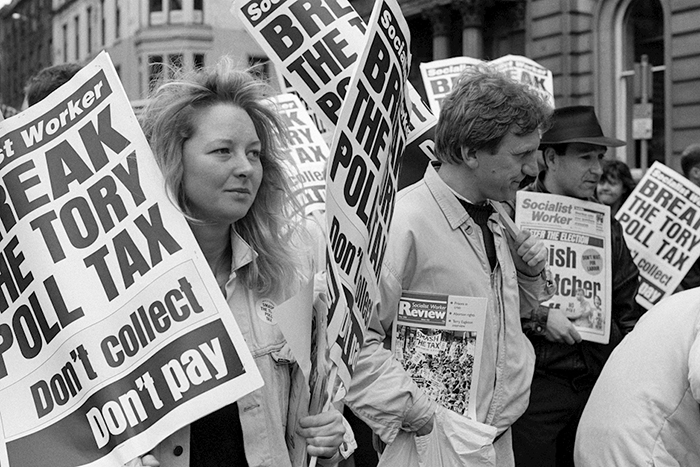
There are few accounts of Scotland’s social and political history that do not refer in some way or another to the events of Red Clydeside. As highlighted in these pages, the controversy around the meaning of Red Clydeside for trade unionists, historians, academics and political activists remains a potent source of political debate. The Red Clyde has also become an important historical symbol of working-class protest, which is called upon or referred to in struggles that have taken place in Glasgow and across Scotland in the late twentieth century and in the early decades of the current centuryActivists and trade unionists have often portrayed the struggles and conflicts in which they are, or have been engaged, as in some way echoing the traditions of Red Clydeside and keeping the socialist flames of 1919 alive.
In the late 1980s and 1990s, the rebellion against the ‘Poll Tax’, introduced by the Thatcher Conservative UK Government, and other struggles over housing and other forms of public provision in working class areas, was very much presented as continuing with the traditions of community struggles, echoing the 1915 Glasgow rent strikes and other rent strikes in the 1920s in towns in other areas of Scotland .
Since the late 1980s and 1990s, though this continues to inform political debate and activism in the city today, there has been a concerted effort on the part of many activists and commentators in Glasgow to celebrate the events of the Red Clyde and 1919 in the face of what is regarded as an attempt to ‘sanitise’ and depolitise the city’s past. This sanitisation has been viewed as part and parcel of the rebranding and reimagining of Glasgow since the early 1980s. Glasgow’s year as European City of Culture, 1990, brought these arguments and controversies to the fore and groups such as ‘Workers City’ fought to ensure that Glasgow’s socialist past was not removed from the city’s history.
Red Clydeside has been mobilised in other ways to garner support for other important political causes and movements. Increased support for the Scottish National Party in the early 2000s has been followed by growing demands for Scottish Independence which, despite the outcome of the 2014 Scottish Independence Referendum, that saw the pro-independence argument defeated,remains a key political issue in Scotland several years on. However, the rise in support for an Independent Scotland and in Scottish nationalism, and the complex relationship between issues around class and nation, has re-ignited historic debates and generated new ones about the viewsof some of the leading actors of the Red Clyde era in relation to questions of Scottish independence and demands for a Scottish Socialist Republic.
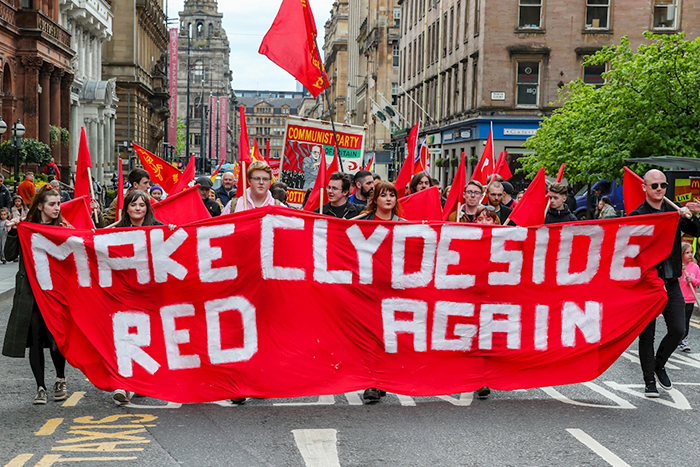
From Red Clydeside to Scottish Independence?
There is a ‘left-nationalist’ position in Scotland that has a long history, and which continues to be a potent element in political debates and narratives in Scotland today. It finds echoes primarily in claims that Scottish nationalism, unlike many other nationalisms, is a progressive force for change. It is accompanied by repeated claims that Scottish people are in some way more ‘left’ orientated than those living in England and elsewhere in the UK. This argument has been heavily criticised and disputed, but it remains a potent standpoint and which works to shape Scotland’s distinctive political climate.
Other reflections on Red Clydeside:
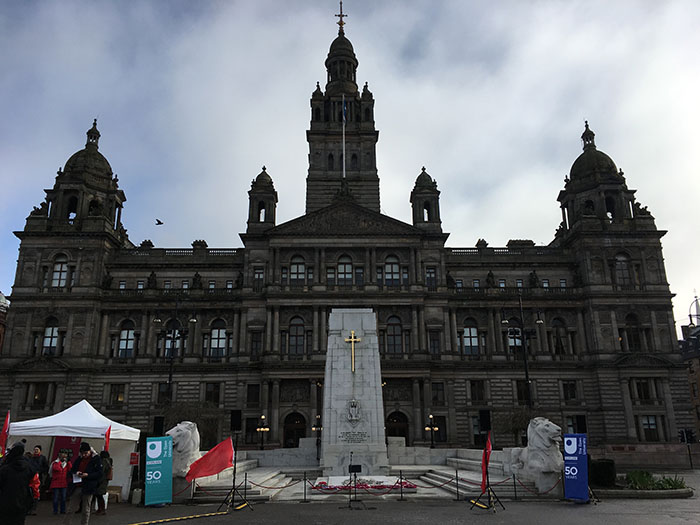 Preparing for The Open University event in George Square, Glasgow
Preparing for The Open University event in George Square, Glasgow
One of the main aims of the 2019 Open University event was to highlight some of the enduring legacies of 1919 for political events in Glasgow, and which also reflected on George Square as a site of protest over much of the 100 years since 1919. From the late 1990s, Glasgow has experienced successive and numerous strikes by public sector workers. In 2018, the major dispute centred on the struggle among women workers employed by Glasgow Council for equal-pay. The role of women in the struggles during the Red Clyde period, notably during the 1915 rent strike which was largely led by working-class women, was a theme picked-up by some of the speakers as they considered the role of women in protest in Glasgow, then and now.
That the centenary of events in Glasgow on 1919 could be said to be relevant today is also evidenced in a number of other ways: on these pages we have referenced several media articles that reflected on these events on or around the centenary itself. These include coverage by the BBC News Online, several newspapers and other articles and pieces written about the event. New books have been published in 2018 and 2019 that either directly relate to Red Clydeside or to some of its central characters, such as John Maclean:
Henry Bell, 2018, John MacLean: Hero of Red Clydeside, London, Pluto Press.
Kenny MacAskill, 2019, Glasgow 1919: The Rise of Red Clydeside. London, Biteback Publishing. Extract available here.
Books such as these have generated review articles, online discussions and blog pieces while, as has been highlighted throughout this material, new studies and interpretations of the period continue to emerge in academic output, in online blogs and in other commentary pieces. We provide a link to some of these as way of demonstrating the continuing interest with Red Clydeside.
At the Open University event in January 2019, several of the speakers made references to the legacies of the events of 1919 for protests, strikes and struggles on Clydeside a century later. In particular there was a focus on the role of working-class women employed by Glasgow City Council struggling for better pay and conditions and who organised in the workplaces to challenge management and council leaders for equal pay.
Councillor David McDonald, Deputy Leader, Glasgow City Council
Mags McCarthy, Open University Tutor, UNISON Divisional Convenor and former Labour Party Parliamentary Candidate
Jennifer McCarey, Chair of Glasgow Trades Council
Lyn-Marie O’Hara, Glasgow City Council UNISON Shop Steward
Not surprisingly Red Clydeside remains an important topic of debate for socialists in Scotland today. In early 2019 different socialist organisations held meetings in the city reflecting on the events of 1919.
Jonzip McNeil, Musician and Songwriter
 This article is part of the Revisiting Red Clydeside: 'Bloody Friday': The Battle of George Square, Glasgow, 1919 collection. All the media-rich articles in this collection provide an introduction to Red Clydeside and consider the developments that led to the Battle of George Square in Glasgow in January 1919, and also reflect on the enduring legacies of this period.
This article is part of the Revisiting Red Clydeside: 'Bloody Friday': The Battle of George Square, Glasgow, 1919 collection. All the media-rich articles in this collection provide an introduction to Red Clydeside and consider the developments that led to the Battle of George Square in Glasgow in January 1919, and also reflect on the enduring legacies of this period.
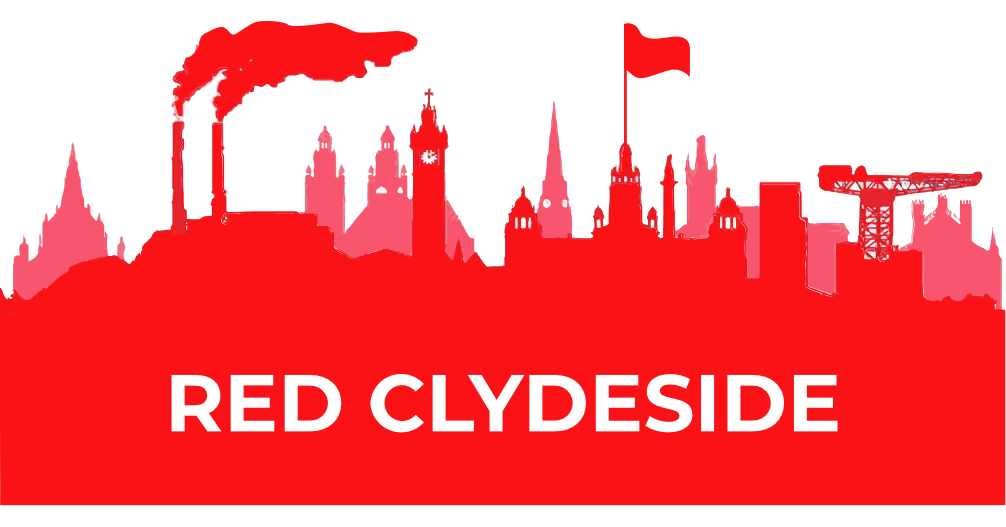

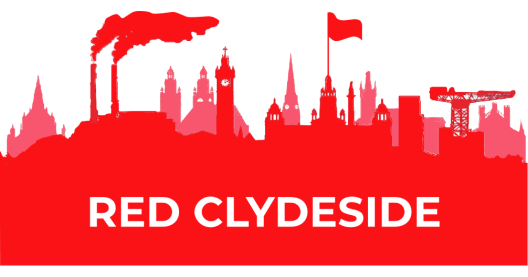




Rate and Review
Rate this article
Review this article
Log into OpenLearn to leave reviews and join in the conversation.
Article reviews
Socialist Labour candidates for Parliament won hands down and Scotland became a socialist country for decades until Blair and Brown dropped the socialist ethic, went to war against the expressed wishes of the Scots' electorate ( 'The Long People's March against war.' ) and Labour became right wing and called itself New Labour. Scotland got rid of Labour and the SNP swept to power, taking up the socialist ethic ditched by Labour.